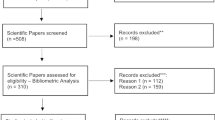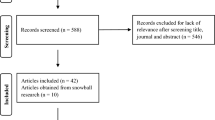Abstract
To recycle or reuse used containers, it is necessary first to collect them. One way to do this is to give rewards to persons who return used packaging and containers to designated places. Many Japanese university cooperatives use recyclable lunch boxes for take-out food, and they collect used boxes in a variety of ways, including such reward giving. By analyzing the responses of university cooperatives to questionnaires on the ways that they collect used recyclable lunch boxes, this study examines the effect of this reward giving on the collection rate. The study results suggest that cash rewards are more effective in increasing the rate of return of used containers than setting up collection boxes that offer no rewards upon return, or giving point-based rewards.

Similar content being viewed by others
References
Tasaki T, Numata D, Matsumoto T, Tojo N (2010) Reframing the concept of collection systems with economic incentives—based on the review of deposit-refund systems and point systems. Research Report from the National Institute for Environmental Studies, Japan, No. 205 (R-205-2010). (in Japanese) http://www.nies.go.jp/kanko/kenkyu/setsumei/r-205-2010.html, accessed on 19th November 2014. The English version can be downloaded from http://www.nies.go.jp/kanko/kenkyu/enpdf/r-205-2010-e.pdf, accessed on 19th November 2014
Usui T, Takeuchi K (2014) Evaluating unit-based pricing of residential solid waste: a panel data analysis. Environ Resource Econ 58:245–271
Lindhqvist T (2000) Extended producer responsibility in cleaner production—policy principle to promote environmental improvements of product systems. Doctoral dissertation, Lund University, http://www.lub.lu.se/luft/diss/tec355.pdf, accessed 8 July 2014
Organization for Economic Cooperation and Development (OECD) (2001) Extended producer responsibility—a guidance manual for governments. http://www.oecd-ilibrary.org/environment/extended-producer-responsibility_9789264189867-en, accessed 5 July 2014
Saphire D (1994) Case reopened: reassessing refillable bottles. Inform Inc., New York
Numata D (2011) Classification of collection system for used lunch boxes—based on interviews to university cooperatives. Proceedings of the 22nd Annual Conference of the Japan Society of Material Cycles and Waste Management, 31-32, (in Japanese) https://www.jstage.jst.go.jp/article/jsmcwm/22/0/22_0_16/_article/-char/ja/, accessed 5 July 2014
Ono S, Numata D (2013) Methods for economic examination of introducing deposit-refund systems. Jpn J Soc Environ Econ Policy Stud 6(2):1–11 (in Japanese)
Ministry of the Environment in Japan (2009) Results of situations on reducing plastic shopping bags in Japan. (in Japanese) http://www.env.go.jp/press/file_view.php?serial=13229&hou_id=10937, accessed 5 July 2014
Acknowledgments
This study received help from many university cooperatives in Japan, as well as Yokota Tohoku Co., Ltd., Shuei Co., Ltd., and the author’s seminar students. This study also garnered valuable comments from many people, including Eiji Hosoda (Keio University), Koji Tanaka (Tohoku Business Association of University Co-operatives), Sukanya Ayatakshi (Bournemouth University), and Toshiaki Sasao (Iwate University). I also received many valuable comments from the anonymous referees. The author greatly appreciates all of them. An earlier version of this paper was presented at the 23rd Annual Conference of the Japan Society of Material Cycles and Waste Management, the Society for Environmental Economics and Policy Studies 2013 Annual Conference, the 14th Global Conference on Environmental Taxation, and the Lund University International Institute for Industrial Environmental Economics Lunch seminar. The author assumes responsibility for any errors in this paper.
Author information
Authors and Affiliations
Corresponding author
Rights and permissions
About this article
Cite this article
Numata, D. Empirical analysis of reward to return: based on case studies of lunch boxes in Japan. J Mater Cycles Waste Manag 18, 582–588 (2016). https://doi.org/10.1007/s10163-015-0357-z
Received:
Accepted:
Published:
Issue Date:
DOI: https://doi.org/10.1007/s10163-015-0357-z




